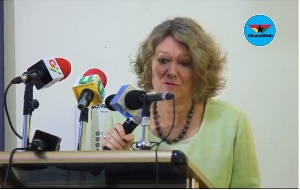Danish Ambassador to Ghana, Tove Degnbol, has said irregular migrants make up between 10 and 20 percent of all migrants and they are a burden on countries of transit and destination.
According to her, the vast majority of the world's 250 million migrants are regular and enter destination countries legally.
"They contribute significantly to global development and have done so for centuries. Many of us are descendants of migrants who years back decided to move from one country to another to establish a new life far from home," she said.
Speaking at the signing of a Memorandum of Understanding (MoU) between the International Centre for Migration Policy Development (ICMPD) and the GIS Ms Degnbol said the Danish government is supporting Ghana Immigration Service (GIS) with 1.3 million Euros on irregular migration.
"Our support should be seen in the light of the events in 2015 when more than one million refugees and irregular migrants arrived in Europe. We saw a dramatic increase of the tragedies on the Mediterranean sea, heard terrifying stories about the dangers of crossing the Sahara desert and received the unbearable reports about having being locked up in camps in Libya," she said.
"The use of fraudulent identity is often a necessity for those that engage in trafficking in persons, smuggling of migrants, terrorism, smuggling of drugs, weapons and other contraband goods, and other forms of cross-border crimes,’’ she noted.
Ms Degnbol added that strengthening Ghana immigration Service through training, sharing of good practices with relevant European migration institutions, and provision of documents fraud equipment will improve the management of irregular migration flows.
Ms. Tove stressed on the fact that although the number of irregular migrants arriving in Europe has reduced, migrants are still drowning in the Mediterranean sea and they consider it due diligence to act now in order to prevent new humans tragedies in the future because one life lost to the sea will always be one life too many.
She went on to state that Denmark believes in a comprehensive approach to address migration based on solidarity and shared responsibility.
"We are committed to working together to improve cooperation on the international migration in order to make it safe, orderly and regular’’ she said.
The GIS-Danish project ‘Strengthening Border and Migration Management in Ghana’ (SMMIG) was launched at the GIS Headquarters in Accra. The project funded by the government of Denmark through the Danish Ministry of Foreign Affairs will be implemented by the International Center for Migration Policy Development (ICMPD).
It is to support the government of Ghana in strengthening institutional and operational capacities to manage irregular migration flows and also assist the GIS in the implementation of its 5-year strategic plan from 2018 to 2022.
The SMMIG will also strengthen the capacity of GIS staff to detect forged and falsified travel documents, provide training in profiling, imposter detection and risk analyses.
The project will help to strengthen cooperation and information exchange between the respective units of GIS involved in the control of irregular migration while strengthening intra-agency and regional cooperation.
A major component of the SMMIG project aims to strengthen the effectiveness of document inspection through the provision of modern equipment at key entry points, at Document Fraud Expertise Center (DFEC) laboratory and for training purposes.
General News of Wednesday, 12 December 2018
Source: www.ghanaweb.com

















